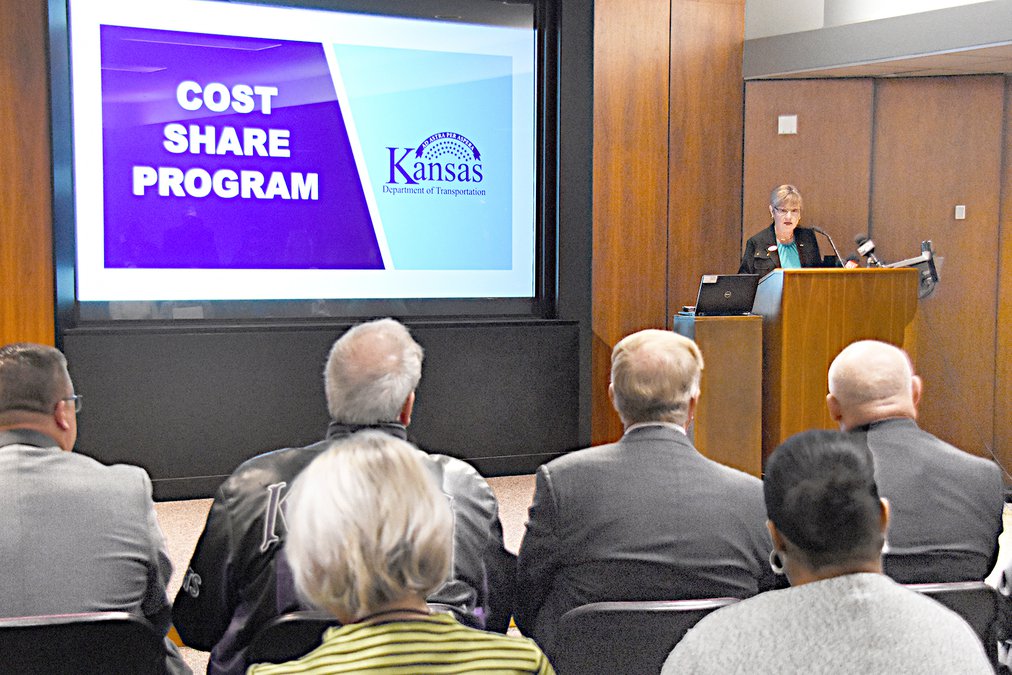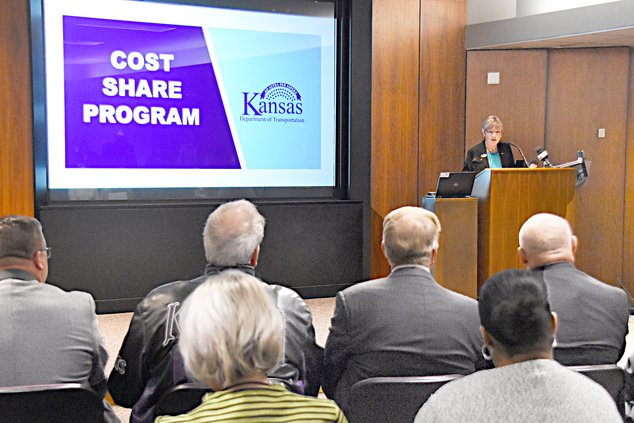Gov. Laura Kelly and Transportation Secretary Julie Lorenz announced the projects selected as part of the Kansas Department of Transportation’s new Cost Share Program in a news conference Tuesday morning at the Eisenhower State Office Building in Topeka. City of Great Bend and Barton County officials liked what they heard.
There were nearly 100 applications in the first round of the new highly competitive KDOT plan. In the end, 22 projects were selected, totalling nearly $74 million in state, local, federal and private investment in transportation improvements statewide.
Two of three area projects submitted made the cut. These were a $400,000 county project to improve an intersection on K-4 just north of Redwing, and a city project totalling $3.4 million to resurface most of 10th Street and rework the historic Sunflower Rod and Custom Association drag strip.
The third, a joint $865,000 project between Barton County and the City of Great Bend for the resurfacing of SW 40 Avenue between U.S. 56 and West Barton County Road, also known as Airport Road, was not included.
“It was exciting,” Great Bend City Administrator Kendal Francis said. “It was really good news.”
However, “I have more questions than I have answers,” he said. The city’s 25% match comes to $1.15 million, but time lines and details remain sketchy.
“The hard part is done,” Francis said. “More work is still to come.”
As for Redwing, County Engineer Barry McManaman was glad to hear it was approved. The county will also be eligible for a 25% match.
The state’s cost-share effort covers only the construction, McManaman said. So, for the intersection, KDOT will fund up to $206,745 with the county covering $68,915, as well as the design and inspection costs.
A big need
“There is pent up demand for transportation investments across our state,” Lorenz said. “I am excited to provide resources to help build safer, healthier and livelier communities that Kansans – young and old – want to make their forever homes.”
The program will provide funding to local entities for transportation projects that improve safety, support job retention and growth, improve access or mobility, relieve congestion and help areas across the state improve the transportation system, she said.
Background
Funding for the $39 million in grant awards is part of the $216 million authorized by the Legislature and Kelly to remain in the state highway fund in fiscal year 2020. In addition to the Cost-Share Program, those funds are being used to increase highway preservation, help complete delayed T-WORKS projects, improve safety and provide new funding opportunities for cities and counties.
In all, the agency received 92 cost-share applications with more than $92 million in local investment and requesting about $242 million in state funds.
The Cost Share Program was announced Sept. 3 and has up to $50 million available in the program for fiscal year 2020. Applications were submitted in the first round of the program from across Kansas.
The program provides financial help that pools state funding with local and private funding for projects related to job growth and retention, said Lindsey Douglas, KDOT deputy secretary of policy and fiscal affairs. “It will provide funding to local entities for construction projects that improve safety, increase the total transportation investment and help both rural and urban areas of the state improve their transportation system.”
The idea for the cost-share effort is to help KDOT fund projects that languished after agency funds were siphoned away to make up shortfalls in the state budget. The shortages came about after former Gov. Sam Brownback-era tax cuts.
Known as the “bank of KDOT,” needed transportation money is now being restored, Kelly said. “My goal is to close the bank of KDOT by 2024.”
The new program demonstrates the importance of combining state and local funds to address transportation needs across Kansas, Kelly said. “While we weren’t able to approve all applications representing requests totaling more than a quarter of a billion dollars, the high interest proves it’s time to develop a new transportation plan for the state.”
All transportation projects are eligible, including roadway (on and off the state system), rail, airport, bicycle/pedestrian and public transit. They must be construction projects that address an important transportation need such as promoting safety, improving access or mobility, improving condition or relieving congestion.
Applications will be accepted on an ongoing basis and will be reviewed twice per year, in October and March. Selection criteria will include consideration of projects that meet program objectives, eligibility categories and requirements. Geographic distribution will also be considered during project selection.








